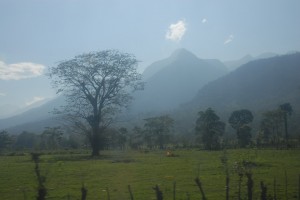Tourism and development
There is an irony in the comment of a Swiss traveller I met recently, who lamented that both Costa Rica and Honduras are insufficiently ´third world´to retain his interest. This sounds a bit arrogant. What he was reflecting was that homogenization of the streets and the food by multi-national companies had erased some of the special characteristics of each country. With regard to food, for example, he claimed to have found it difficult to find typical Honduran food between the outlets for Kentucky Fried Chicken and McDonalds. The second element he lamented is that Costa Rica is well organized, and he enjoys a bit of disorganization when on holiday (compared to Switzerland!).
Well, now I am in Honduras, and it is true that San Pedro Sula, the second largest and very commercial-centred city, is like any other city with bright modern buildings and fast food joints (Medellin, Dublin, and many others). I found it a bit of a relief, after the huge expanse of small one-story houses lining dirt roads covering the valley of Tegucigalpa, the capital of Honduras. The two cities clearly show the inequality that is rampant here. People in San Pedro Sula told me that jobs are hard to come by, and blamed the minimum salary of US$300 per month (so, 15US$ per working day in a 5-day work week) for being too high. In Copàn Ruins as well, a local told me the one thing needed was more work opportunities. At the same time, violent street thefts and highway robberies are quite common.
The person with whom I was travelling yesterday most certainly did not share the appreciation of the Swiss man above for lack of organization. When he found out that the early bus to Copàn ruins was cancelled and he had to wait two hours for the next one, he was very dismayed. (This Copàn-destined man was European, I hasten to say, to alleviate prejudices.) The generosity of locals to help was very inspiring. At one point, we were surrounded by no fewer than eight different people, staff of various bus companies, some of whom had left their stations to help us. They found a solution that involved only waiting one hour, taking a local bus, and then changing to another local bus after a two hour trip. This didn´t fit with the expectations of my companion, either, and, in the end, we took the direct line two hours later. I am relieved we didn´t choose the local-and-change option, if only because of the fatalities and bus robbery reported in the morning paper. (I`ve since been told these are buses that stop along the way, and direct buses are not subject to the same sort of assaults. I hope so, as I am off for another 6-hour trip tomorrow, to La Ceiba on the Caribbean coast.)
There is an odd tension with tourism, as I saw before when someone left a Spanish school due to the less than pristine quality of the renovations in her bedroom. It makes sense: people have saved time and money for a dream trip, and dreams are dreamt to go smoothly. But to expect the shiny, recently updated fixtures, and the availability of a second bus when one needs repairs, is part of the over-consumption of the countries where things are organized to go more smoothly. It is indeed a loss of the experiences of elsewhere, the reason to travel, to expect timely buses and modern bedrooms.
My companion later made it to the Copàn Ruins, and, after an hour, told me he had `done` it: `I climbed some stairs and took some pictures,` he said. Me, I spent three hours wandering through the sculptures, filling up my camera card. That was just enough time to wonder at the many hillocks which are unexcavated buildings. Apparently, 2 km2 is excavated, and a survey estimated about 24 km2 of Mayan ruins in the Copàn Valley. Tourism is about observation, as I have mentioned before, but, at least for me, observation takes time. I wonder about the flying visits, why they are satisfying to the locals. I remember faintly a comment about the legacy of the Grand Tours of European nobility in the 19th century and their inspiration in romantic paintings, that the image as framed was almost like a souvenir. Perhaps the flying-by tourists are creating a photo album during their visit, rather than an experience.


Leave a Reply